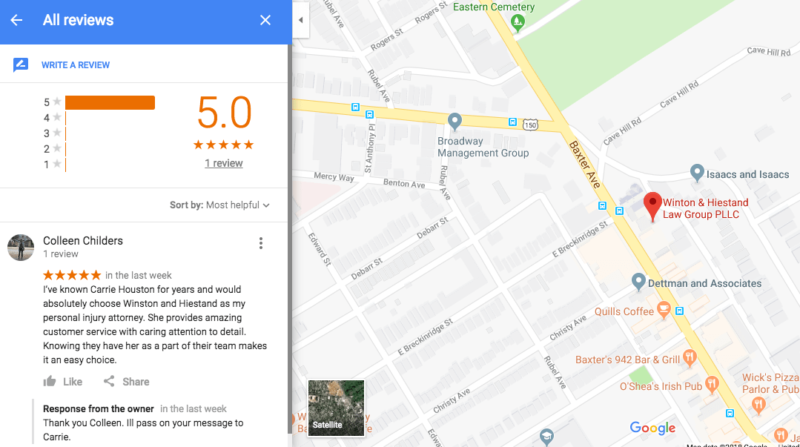Law firm that used contest to solicit Google reviews sees all but one disappear
Incentivizing reviews individually or 'in bulk' is a bad idea.
Reviews are an essential part of doing business online. They heavily influence consumer buying and local rankings. But as Joy Hawkins points out, using rewards or other incentives to help generate them is a bad idea.
A law firm in Louisville, Kentucky, Winton & Hiestand Law Group, had the vast majority of its reviews on Google removed after it was discovered that the firm was incentivizing people to review the business with contests and giveaways.
The firm had roughly 100 reviews on Google before the matter was reported in Google My Business forums. As of this moment, the firm has a single review on Google (albeit five stars). The firm was giving out family zoo passes as the incentive in this case.
On Facebook, the firm has 1,000 five-star reviews. It may well be that a high percentage of these are the byproduct of contests and incentives. Google previously stated this policy against using financial incentives to generate reviews:
Don’t offer or accept money, products, or services to write reviews for a business or to write negative reviews about a competitor.
However, that language appears to be gone. In its place are the following guidelines (Thanks, Mike Blumenthal):
- Don’t use reviews for advertising purposes. This includes, but is not limited to, posting email addresses, phone numbers, social media links or links to other websites in your reviews.
- Don’t include promotional or commercial content.
- Don’t offer or accept money in exchange for reviews.
- Don’t solicit reviews from customers in bulk.
It’s an open question whether offering a contest (for a zoo pass or equivalent), directed to a group and not as a quid pro quo to an individual, qualifies as “money” or “compensation” for reviews. Regardless, Google obviously felt that this situation violated its guidelines and removed the reviews. It may be that this was an example of “bulk” solicitation.
So whether this was an innocent mistake by the law firm or a case of trying to manipulate and game the system, the firm was penalized. This argues against offering any sort of contest or compensation in any form as a review incentive. Google does not appear to be barring businesses from asking (without incentives) for individual reviews versus “in bulk.”
Yelp is even more strict on this point and will publicly identify and shame businesses with Consumer Alerts if there’s evidence that a business has violated its policies and is attempting to incentivize or improperly obtain reviews.
Beyond these individual company policies, there are state laws or federal regulations (FTC rules against “consumer deception”) that may be implicated by improper review solicitation.
Postscript: Google confirmed in email that contests to solicit reviews en masse are a violation of its policy against bulk review solicitation. The following is from a Google spokesperson:
Contests to generate reviews are a violation of policy. Our policy states that businesses should not solicit reviews from customers in bulk.
Opinions expressed in this article are those of the guest author and not necessarily Search Engine Land. Staff authors are listed here.
Related stories
New on Search Engine Land

